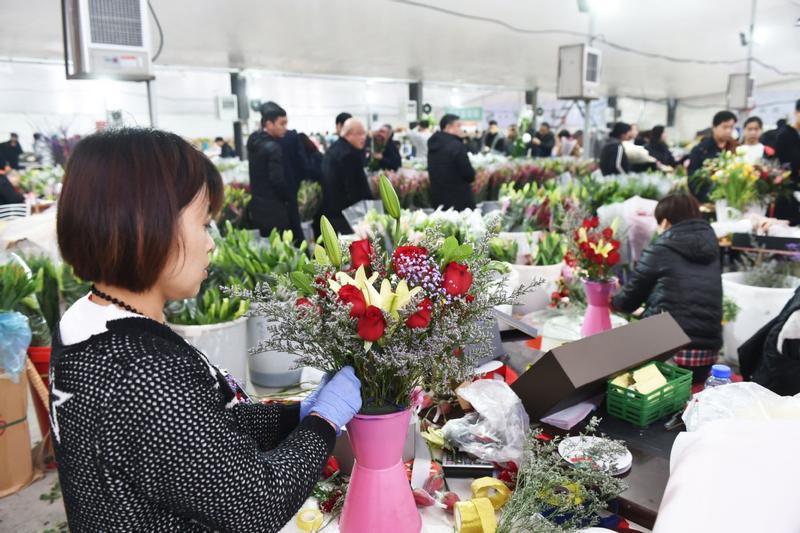 A store owner arranges a bouquet in Hebei Xinfadi, Hebei province, last year. (PHOTO PROVIDED TO CHINA DAILY)
A store owner arranges a bouquet in Hebei Xinfadi, Hebei province, last year. (PHOTO PROVIDED TO CHINA DAILY)
After spending 12 years selling flowers wholesale in Beijing, Zhang Xiaoyan left her rented apartment in Daxing district and moved to neighboring Hebei province, where life is easier and she is seeing an upturn in business.
Having arrived in the capital from her native Sichuan province in 2006, she relocated to Gaobeidian in Baoding, about 70 kilometers southwest of Beijing, about a year ago.
In the past five years, more than 7,900 companies and other entities have relocated to cities in Hebei from Beijing or Tianjin, Hebei Daily reported
"Initially, I was reluctant to move because I was used to living and working in Beijing," the 42-year-old said, adding that many other wholesalers in the capital's flower markets have relocated in recent years as the government seeks to reduce the number of people engaged in businesses that do not need to be located in the capital.
Key strategy
In 2014, the central government initiated a key strategy to coordinate the development of Beijing, Tianjin and Hebei, with the transfer of non-capital functions being a major task.
A year into her new life, Zhang has been pleasantly surprised. Her business has flourished in Hebei Xinfadi, a wholesale market and logistics center for agricultural produce.
As an established major relocation cluster in the region, the market has expanded rapidly. Since it was established in 2015, it has become home to 6,200 wholesalers of fruit, vegetables, cooking oil, nuts, condiments, beverages and flowers.
"The costs of business and life are lower, thanks to the market's supporting policies and the low cost of living, plus the wholesale business seems to be better than in Beijing," Zhang said.
She said her store, which covers 160 square meters at Hebei Xinfadi, is rent-free for the first three years, which will save her about 70,000 yuan (US$10,000) per annum, which was what she paid in Beijing.
To help newly settled wholesalers develop their businesses, the market, which is spread over 139 hectares, also covers daily expenses, such as lodgings and food, for customers who visit from other places looking to make deals, she said.
In the first half of last year, nearly 300 manufacturing companies moved out of Beijing, and more than 50 markets and logistics centers were either relocated or upgraded, according to Xinhua News Agency
The wholesalers supply products to 13 provinces and regions in northern China, including Shanxi, Shandong, Beijing and Tianjin. More than 15 supermarkets in Beijing purchase agricultural products from Hebei Xinfadi, according to the market's publicity office.
READ MORE: Industrial relocation won't curb growth
"With the market expanding, my business has increased," Zhang said, adding that in the past year, she has sold goods worth 6 million yuan-about twice the value of her annual sales in Beijing.
According to the market's publicity office, about 80 percent of the wholesalers at Hebei Xinfadi-some 20,000 people-come from Beijing.
Many similar bases have been established in Hebei to receive nonessential businesses from the capital, such as the Mingzhu Commodity Trade City in Cangzhou, a clothing wholesale cluster set up as a base for Beijing's clothing industry.
ALSO READ: Tibet nomads give support to relocation plan
In the past five years, more than 7,900 companies and other entities have relocated to cities in Hebei from Beijing or Tianjin, Hebei Daily reported.
Moreover, in the first half of last year, nearly 300 manufacturing companies moved out of Beijing, and more than 50 markets and logistics centers were either relocated or upgraded, according to Xinhua News Agency.
The major role of Xiongan New Area in Hebei, established in 2017, is to receive and develop Beijing's non-capital functions, as a way to adjust the region's economic structure and provide balanced, coordinated development.
In addition to the industrial and retail transfers, integrated development in the key fields of transportation and environmental protection has also achieved positive results.
For example, a high-speed railway linking Beijing and Hebei's Zhangjiakou opened at the end of last year, cutting the journey time from more than three hours to about 50 minutes, according to 12306, the national online rail ticket platform.
Xinhua noted that environmental programs resulted in the average concentration of PM2.5-harmful particulate matter that can enter the bloodstream via the lungs-in 13 major cities in the Beijing-Tianjin-Hebei region at 57 micrograms per cubic meter in the first half of last year; a major improvement compared with previous years.


